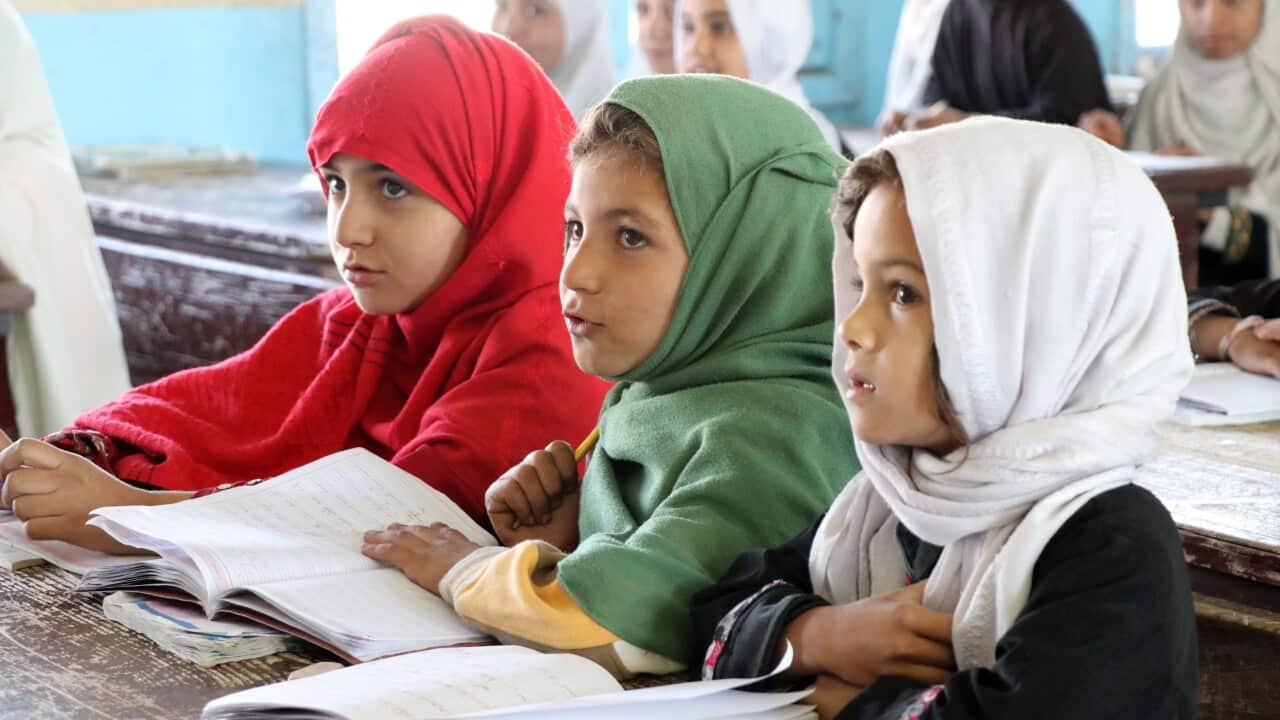Highlights
- The principal of the Malilai school for girls in Uruzgan is in hiding over fears posed by the Taliban.
- Mahtab Ahmadi fears the return of the "dark days" of education under Taliban rule.
- Amnesty is calling on the international community to fight for women's rights in Afghanistan.
As principal of the Malilai Girls’ School in the central Afghan province of Uruzgan, Ms Ahmadi was tasked with running the 23-classroom facility built by the Australian Defence Force's Provincial Reconstruction Team in 2011.
She held the position for three years before the school was temporarily closed when the Taliban seized power in mid-August.
Ms Ahmadi is now in hiding over fears posed by Taliban rule and the school is running at only a fraction of its 700-student capacity.
While classes have resumed for male students since the Taliban’s return to power, girls above the sixth grade have not been permitted to return.
"If they continue doing this, the education system will return to the dark days of when the Taliban were last in power," Ms Ahmadi fears. SBS News:
SBS News:

Source: SBS
She says schools across the province have experienced a significant drop in attendance over recent months.
"Some boys and girls have moved to another province and also a significant number were not attending the schools for security, economic, family, and underage marriage reasons."
'I have lost my hopes and felt threatened'
The Australian Defence Force deployed its first Reconstruction Task Force to Uruzgan in 2006, and a Mentoring and Reconstruction Task Force began work in the province two years later.
The school, based in Uruzgan's capital city Tarin Kowt, took 15 months to build at a cost of US$1.6 million and includes three laboratories and a gymnasium.
Its construction was intended to significantly boost girls' education in Uruzgan, Ms Ahmadi says.
She says the facility replaced an existing school that had a limited capability following the US invasion in 2001.
"We originally had a small school with only eight classes [and the ADF] built a new and big school. I was involved in advising on school construction and suggestions on sporting places for girls," Ms Ahmadi says.
The Taliban has claimed they will allow girls to return once they have ensured security and stricter segregation measures under their interpretation of Islamic law, though many remain sceptical.
Nobel Peace Prize winner Malala Yousafzai, who was shot by the Pakistani Taliban as a schoolgirl in 2012,
"To the Taliban authorities...reverse the de facto ban on girls' education and re-open girls' secondary schools immediately," Ms Yousafzai and a number of Afghan women's rights activists said in an open letter published on October 17.
Ms Yousafzai called on the leaders of Muslim nations to make it clear to the Taliban that "religion does not justify preventing girls from going to school".
"Afghanistan is now the only country in the world that forbids girls' education," the letter read.
Ms Ahmadi decided to go into hiding out of fear that the Taliban would target her due to her affiliation with the school, and she plans to leave the country.
"After the Taliban took control of Uruzgan province, our school doors were shut, and I have fled and am now in hiding. I have lost my hopes and felt threatened.
"I feel very insecure because my work was at a girls’ school, and I was running a women’s empowerment NGO. My past is a threat to my present."
Despite her current circumstances, she's thankful for the Australian forces who changed the lives of many in Uruzgan.
“I am still thankful to the Australian government for building the great school, and we have never felt any shortfalls.”
Amnesty International Australia campaigner Nikita White tells SBS Pashto girls in Afghanistan must be allowed to return to secondary school and continue their education.
“The right to education is a fundamental human right, which the Taliban are duty-bound to uphold.
“The Taliban said there must be a ‘safe learning environment’ before girls can return to school, but Amnesty has spoken with students and teachers who have been harassed and threatened by the Taliban.
One teacher received death threats because she taught co-ed sports, and two students were beaten unconscious by the Taliban for going to an English class.
Amnesty is calling on the international community to fight for women's rights in Afghanistan.
“The world should be absolutely concerned about the lack of access to education for female students,” Ms White says.
“The policies currently pursued by the Taliban are discriminatory, unjust and violate international law.”
Amnesty is calling on the international community to fight for women's rights in Afghanistan.




